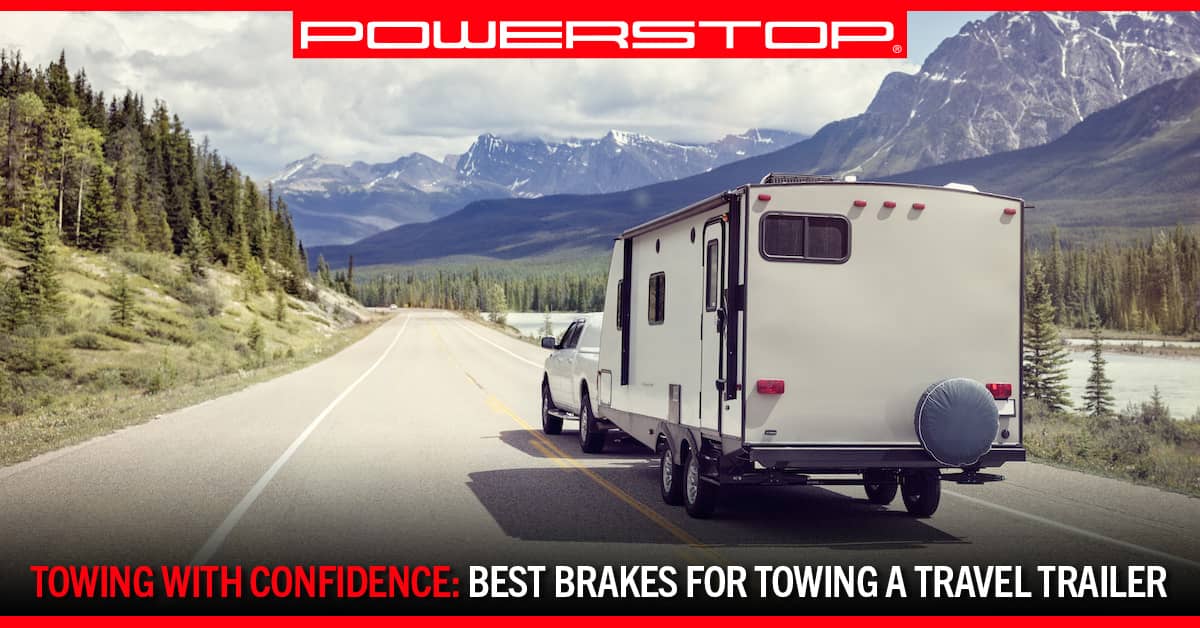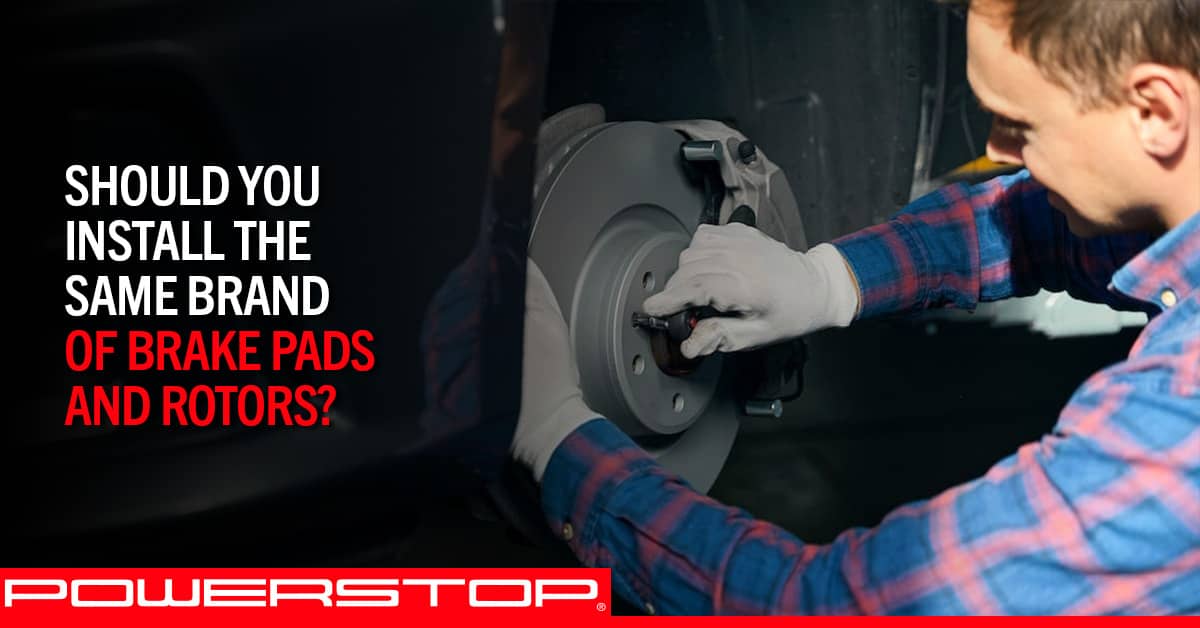
When looking for the best brakes for towing a travel trailer, there are many things to consider. This guide will help you make an informed decision and find the best brakes for you and your towing needs.
Below, we discuss the important factors you should think about when choosing the best brakes for towing a travel trailer and offer some suggestions that you can count on to haul your cargo safely.
What Are the Best Brakes for Towing a Travel Trailer?
Safety is the top priority when it comes to selecting the best brakes for towing a travel trailer. Travel trailers typically weigh between 1,500 to 6,300 pounds. If your vehicle can’t handle the task of pulling and stopping such a heavy load, it could put your safety and the safety of others on the road in jeopardy.
There are numerous brake choices available, which can make it challenging to determine which ones are trustworthy. This is why we’ve created a comprehensive guide to help you understand the key factors in selecting the best brakes for towing a travel trailer.
The Material of Your Brake Pad
The performance of your truck’s brake pads is heavily influenced by the material they are made of, with durability and friction being the key factors. You may encounter diverse conditions when towing a travel trailer, from steep dirt roads to extended highway drives, so you need brake pads that can handle a range of situations.
There are several types of brake pads available:
- Ceramic Brake Pads: These are a cost-effective and reliable choice for travel trailers. Ceramic brake pads provide excellent wear resistance and consistent friction levels, making them suitable for standard towing needs.
- Carbon Fiber Brake Pads: Known for exceptional wear resistance and high friction coefficients, carbon fiber brake pads are particularly effective for heavy-duty towing. Their use of carbon fiber ensures longevity and top-tier braking power, making them ideal for travel trailer applications.
- NAO Brake Pads (Non-Asbestos Organic): These brake pads utilize organic components such as fibers, glass, rubber, and high-temperature resins. With a softer composition compared to metal-based pads, NAO pads reduce noise levels and alleviate strain on the rotors.
- Low Metallic Brake Pads: Containing 10 to 30 percent metal, typically steel or copper, in addition to organic materials, these pads offer a balance between durability and noise reduction.
- Semi-Metallic Brake Pads: Comprising 30 to 65 percent metal, semi-metallic pads are commonly made from materials like wire, copper, graphite, or steel wool, combined with a friction-modifying element.
PowerStop’s Z36 Truck & Tow Carbon-Fiber Ceramic Brake Pads deliver best-in-class performance and reliability. With a blend of carbon and ceramic, these brake pads excel in all weather conditions, minimize noise and vibrations, and come equipped with premium stainless steel hardware. Choosing PowerStop means investing in safety, durability, and peace of mind.
Heat Dissipation
Braking operations produce significant heat as a result of the friction between the brake pads and the rotors. Effective heat dissipation is crucial to prevent permanent deformation of the brake pads.
The PowerStop Z36 Truck & Tow Carbon-Fiber Ceramic Brake Pad’s design aims to diminish brake fade, ensuring severe-duty stopping power for heavy-duty applications without compromising everyday drivability. An ideal choice for towing a travel trailer, these brake pads are crafted to provide better heat dissipation to ensure maximum safety under braking.
Braking Noise
Undesirable noise during braking, especially while towing a travel trailer trailer, can stem from the vibrations and friction between the brake pad surface and the rotor. To mitigate this, many towing brake pads are engineered to minimize vibrations during braking, resulting in a notable reduction in noise levels.
Proper maintenance also plays a vital role in noise prevention. Regularly cleaning the brake pads to keep them free of dust and dirt can significantly contribute to lowering noise levels, ensuring a quieter and more pleasant braking experience.
Read More: Brake Squeal – Causes and Solutions
How Much Do Travel Trailers Weigh?
Depending on the type, travel trailers can vary significantly in weight.
- Pop-up Trailers: The average weight is 1500 lbs and can be towed by most SUVs and trucks.
- Teardrop Trailers: The average weight is 2500 lbs and can be towed by most SUVs and trucks.
- Small Travel Trailers (less than 25 feet): The average weight is 3500 lbs and can be towed by mid-size SUVs and small pickup trucks.
- Large Travel Trailers ( more than 25 feet): The average weight is 6300 lbs and can be towed by larger SUVs and half-ton pickup trucks.
It’s crucial to remember that the weight of your travel trailer is just one thing to think about when you’re planning to tow it. You also need to think about the weight of the travel trailer’s cargo, and how much your vehicle can handle when towing. If you go over your vehicle’s towing limit, it can be dangerous and make your vehicle handle and brake poorly. Be sure to check the specifications from the manufacturer for both your vehicle and the travel trailer.
What Size Travel Trailer Can My Vehicle Safely Tow?
Your vehicle’s towing capacity refers to the most weight it can safely pull. This depends on numerous factors, such as how the vehicle is set up, how much weight it’s already carrying, and how you load and control the weight you want to tow.
Vehicle manufacturers provide an estimated towing capacity, but it doesn’t adhere to every situation. To figure it out, you need to know a lot more about both your towing vehicle and the travel trailer you want to tow.
Automakers give a towing capacity for each vehicle they make, but this is based on the assumption that the towing vehicle only has the driver inside. If you plan to tow a travel trailer and have your family and all their luggage with you for a weekend trip, the manufacturer’s numbers may not be accurate for your unique situation.
What Is a GCWR?
To figure out how much your vehicle can safely tow, you need to find out the gross combined weight rating (GCRW), or the total weight your vehicle and the trailer will be carrying. This includes everything from the passengers to the gas and windshield washer fluid.
You can find your towing capacity by subtracting the empty vehicle weight from the total weight of the vehicle and trailer combined. Automakers strongly recommend that you never go over this limit. For safety, it’s best to stay at least 10% below that maximum limit.
Loads can shift, people can make mistakes, and unexpected things can happen on the road.
So, it’s not a good idea to push your vehicle to its absolute limit when towing.
What Is GVWR?
The gross vehicle weight rating (GVWR) is the heaviest a vehicle can be with all its cargo, like people, fuel, and the weight of anything you’re towing.
If you go over this limit, you might get stopped by the police and fined. More importantly, an overloaded vehicle that surpasses its GVWR could lead to an accident and unsafe driving. To know your vehicle’s GVWR and other towing details, check your owner’s manual or the label inside the driver’s door.
What Is Payload Capacity?
Payload capacity is the maximum weight that your vehicle can carry safely in both the cabin and the truck bed. This includes things like cargo, luggage, people, or things in the back of a pickup truck.
Knowing your vehicle’s payload capacity is crucial when you’re thinking about getting a truck camper because the entire weight of the camper rests on the truck bed, unlike something you’d tow behind the vehicle.
Payload capacity can be found on your VIN sticker, in your manual, or by subtracting the curb weight of your vehicle (the total weight of a vehicle and all its fluids, including a full tank of gas) by the GVWR.
GVWR – Curb Weight = Max Payload Capacity
Braked vs. Unbraked Towing Capacity
Certain trailers have their own brakes, which are wired to the towing vehicle. When you press the brake pedal in the towing vehicle, it triggers both the vehicle’s brakes and the trailer’s brakes simultaneously. If the trailer has its own brakes, it becomes much easier to control and tow a heavier load.
So, the “braked towing capacity” is the maximum weight your towing vehicle can pull when the trailer has its own brakes, and it’s higher than the “unbraked towing capacity,” which is the weight your towing vehicle can pull when the trailer doesn’t have its own brakes.
What Does 60/40 Load Weight Mean When Towing a Travel Trailer?
When people talk about “60/40 load weight” in the context of towing a travel trailer, they’re usually discussing how the weight is divided between the tow vehicle and the travel trailer. Specifically:
- The “60” means 60% of the total weight is on the front axle of the tow vehicle.
- The “40” means 40% of the total weight is on the rear axle of the trailer.
This weight distribution is crucial for keeping the towing stable and under control. Ideally, you want the weight to be balanced to avoid problems like swaying, difficulty steering, and uneven tire wear. The exact weight distribution can vary based on the type of trailer, the tow vehicle, and what the trailer or vehicle manufacturer recommends.
Properly splitting the weight between the front and rear axles ensures that both the tow vehicle and the trailer carry their share of the load, which improves safety and handling while towing. To tow safely and steadily, it’s important to follow the manufacturer’s guidelines and recommendations for your specific towing setup.
Want Severe-Duty Stopping Power? Get the Powerstop Z36 Truck & Tow Brake Upgrade Kit!
If you’re looking for the best brakes for towing a travel trailer, PowerStop has just what you need. The PowerStop Z36 Truck & Tow Brake Upgrade Kit is specially made to boost braking power for trucks, SUVs, and 4x4s that face tough tasks like driving in the mountains, carrying heavy loads, towing, and going off-road.
This kit includes advanced carbon-fiber ceramic Z36 Truck & Tow Brake Pads, Drilled & Slotted Rotors, stainless-steel hardware, and high-temperature brake lubricant. All of these work together to enhance stopping ability and handle the extra strain of towing a travel trailer.
Here’s what makes this kit stand out:
- Carbon Fiber Ceramic Material: The carbon fiber in PowerStop brake pads ensures top-notch braking performance and durability.
- Premium Stainless Steel Hardware Kit: The hardware parts in the kit are high quality, ensuring they are reliable and last a long time.
- Drilled & Slotted Rotors: The drilled, slotted, and zinc-plated rotors not only provide maximum cooling but also help guard against rust and corrosion.
- All-Weather Design: PowerStop’s Z36 Truck & Tow Carbon-Fiber Ceramic Brake Pads are designed to excel in all weather conditions, making them a reliable choice for vehicles that tow travel trailers.
The best part? The kit is easy to install with no need for vehicle modifications. Plus, it comes with a guarantee, including a 60-day hassle-free return policy and a 36-month/36,000-mile warranty.
PowerStop brakes are built to handle even the toughest conditions. When you choose PowerStop, you can feel confident that you are getting the braking performance you can trust to keep you and your cargo safe.
Have a Question? PowerStop Can Help
PowerStop is dedicated to delivering top-quality performance brakes for nearly every vehicle on the road. If you have a question about any of our products, contact us today online at [email protected] or toll-free at (888) 863-4415. Our customer service team is available to answer your questions Monday through Friday from 8 a.m. to 5 p.m. (CST). Se habla español.
Back



